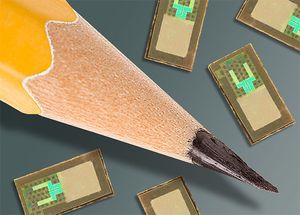



Date:21/01/16
 A team of neurosurgeons and engineers has developed wireless brain sensors that monitor intracranial pressure and temperature and then are absorbed by the body, negating the need for surgery to remove the devices.
A team of neurosurgeons and engineers has developed wireless brain sensors that monitor intracranial pressure and temperature and then are absorbed by the body, negating the need for surgery to remove the devices.
Such implants, developed by scientists at Washington University School of Medicine in St. Louis and engineers at the University of Illinois at Urbana-Champaign, potentially could be used to monitor patients with traumatic brain injuries, but the researchers believe they can build similar absorbable sensors to monitor activity in organ systems throughout the body. Their findings are published online Jan. 18 in the journal Nature.
The new, soluble electronic sensors are smaller than a grain of rice and are built on extremely thin, naturally biodegradable sheets of silicon. These silicon sheets are designed to work for a few weeks before they "dissolve away, completely and harmlessly, in the body's own fluids.
The new sensor technology is capable of monitoring temperature and the pressure of intracranial fluid within the skull with the same level of accuracy as conventional, permanent monitoring devices. “The ultimate strategy is to have a device that you can place in the brain — or in other organs in the body — that is entirely implanted, intimately connected with the organ you want to monitor and can transmit signals wirelessly to provide information on the health of that organ, allowing doctors to intervene if necessary to prevent bigger problems.”
Team develops wireless, dissolvable sensors to monitor brain
 A team of neurosurgeons and engineers has developed wireless brain sensors that monitor intracranial pressure and temperature and then are absorbed by the body, negating the need for surgery to remove the devices.
A team of neurosurgeons and engineers has developed wireless brain sensors that monitor intracranial pressure and temperature and then are absorbed by the body, negating the need for surgery to remove the devices.Such implants, developed by scientists at Washington University School of Medicine in St. Louis and engineers at the University of Illinois at Urbana-Champaign, potentially could be used to monitor patients with traumatic brain injuries, but the researchers believe they can build similar absorbable sensors to monitor activity in organ systems throughout the body. Their findings are published online Jan. 18 in the journal Nature.
The new, soluble electronic sensors are smaller than a grain of rice and are built on extremely thin, naturally biodegradable sheets of silicon. These silicon sheets are designed to work for a few weeks before they "dissolve away, completely and harmlessly, in the body's own fluids.
The new sensor technology is capable of monitoring temperature and the pressure of intracranial fluid within the skull with the same level of accuracy as conventional, permanent monitoring devices. “The ultimate strategy is to have a device that you can place in the brain — or in other organs in the body — that is entirely implanted, intimately connected with the organ you want to monitor and can transmit signals wirelessly to provide information on the health of that organ, allowing doctors to intervene if necessary to prevent bigger problems.”
Views: 1011
©ictnews.az. All rights reserved.Similar news
- The mobile sector continues its lead
- Facebook counted 600 million active users
- Cell phone testing laboratory is planned to be built in Azerbaijan
- Tablets and riders outfitted quickly with 3G/4G modems
- The number of digital TV channels will double to 24 units
- Tax proposal in China gets massive online feedback
- Malaysia to implement biometric system at all entry points
- Korea to build Green Technology Centre
- Cisco Poised to Help China Keep an Eye on Its Citizens
- 3G speed in Azerbaijan is higher than in UK
- Government of Canada Announces Investment in Green Innovation for Canada
- Electric cars in Azerbaijan
- Dominican Republic Govt Issues Cashless Benefits
- Spain raises €1.65bn from spectrum auction
- Camden Council boosts mobile security





















